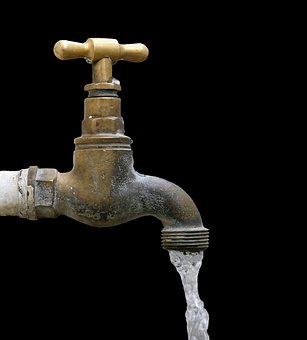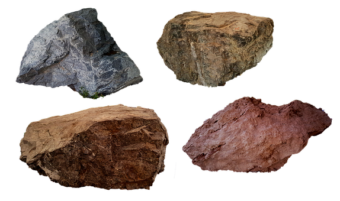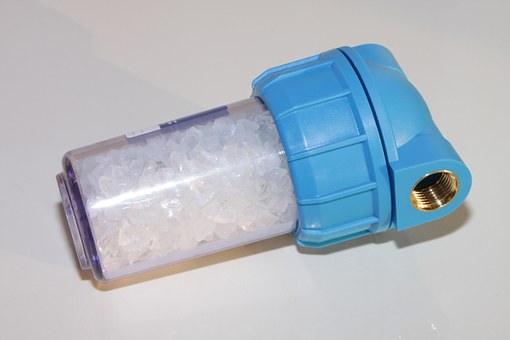In this article, we will be answering the question ‘Is it better to water your container plants with hard or soft water?’
This is because gardeners worry that by watering with tap water that they may cause irreversible damage to the plant, and that they may eventually kill it. They are worried that the excessive metal ions found in normal tap water can, in the long run, cause a healthy plant to turn unhealthy.
This article is written to allay these fears but be warned as the answer is not that straightforward. The problem is tap water concentrations of metal ions changes from area to area, from region to region, from country to country.

I am lucky to live in a soft water area but 20 miles to the East of me, the water is hard. So you can understand the issue raised. The concentration of metal ions will, therefore, change from location to location, often quite close to each other.
Before going into this subject in greater depth we need to answer the question of what hard water is?
WHAT IS HARD WATER?
Hard water is caused by the number of mineral compounds, often called salts that are dissolved in water, which are predominantly magnesium and calcium carbonates and bicarbonates (hydrogen carbonate). Water by nature is soft, containing no metal salts at all.
If rainwater lands on porous rock, such as limestone, it will diffuse through it into the water tablet below. Along the way it will dissolve and react with calcium and magnesium salts, thus turning the water hard (contains metal salts).
To most people who are not aware of the solubilities of calcium and magnesium carbonates will not know that they have low solubilities. This tells us that only small amounts of these materials will be transferred to the water supply but there is not enough to make the water hard.
This is not the whole story, as the carbon dioxide in the air plays a very important part of why hard water forms. When water (not rainwater) flows through limestone, as previously said, only small amounts of magnesium and calcium carbonate will dissolve but when rainwater hits the limestone a chemical reaction takes place when it passes through the same rock.

You see rainwater is naturally acidic and I am not talking about acid rain, caused by sulfur dioxide and trioxide emissions caused by man-made emissions, dissolving in rainwater.
No, this is a different thing, I am talking about the carbon dioxide in the air, which will dissolve in rainwater to form a weak, acidic solution of carbonic acid.
This makes rainwater have a pH of 5.6. This carbonic acid flows through limestone where it will react with magnesium and calcium carbonates, converting them to magnesium bicarbonate (magnesium hydrogen carbonate) and calcium bicarbonate (calcium hydrogen carbonate).
CALCIUM AND MAGNESIUM BICARBONATE ARE THE REASON WHY WATER IS HARD?
These salts are much more soluble in water, especially calcium bicarbonate, which is 1000 times more soluble than calcium carbonate. This is also true for magnesium bicarbonate but to a much lesser rate of only being 50 times more soluble than magnesium carbonate. This would mean that calcium and magnesium ion concentrations would increase, especially compared to normal neutral, pH water.
A map of hard water areas can be found here
If you wonder why they call it hard water, is because calcium and magnesium bicarbonates decompose easily especially when heat is added. The bicarbonates will convert in these circumstances to insoluble carbonates, which precipitates out of the water, causing limescale.

Soft water, on the other hand, is caused when rainwater hits a non-porous rock such as granite. It will not pass through and instead run off the surface of the rock. There is no leaching or any mineral transfer, or chemical reactions, so the level of calcium and magnesium ions in the water is low. This is why the area where granite deposits are high the tap water supplied to your home is predominantly soft.
The situation is complicated, as some areas in the countries will soften their hard water supply.
HOW IS HARD WATER SOFTEN?
Normally to soften water you need to change the cations of magnesium (Mg 2+) and calcium (Ca 2+) and replace them with other more soluble cations, such as potassium (K) and sodium (Na+). Any chemist will tell you that all sodium and potassium salts are soluble in water, so therefore no precipitate is possible if the water is heated.
The hard water can be said to be softened by ion exchanging, as the process is known. This compounds the problem, as now tap water will have high sodium and potassium ion levels, instead of calcium and magnesium, as this will have a different effect on the health of your plants.

You can, therefore, live in threes areas; a soft water area with little calcium and magnesium salt content, a soften water area with high sodium and potassium levels, or a hard water area, where the water will be high in calcium and magnesium ions.
The question now is what harm excessive magnesium, calcium, sodium, or potassium ions will have on the health of the plant?
This will be answered next.
EXCESSIVE MAGNESIUM
A little extra magnesium in your compost from hard water will have little noticeable effect, as this is not readily taken up by the plants. High concentrations of magnesium ions will inhibit the plant’s ability to uptake calcium. This shows up as a classical sign of excessive salt uptake with stunted grown and darkly covered leaves.
EXCESSIVE CALCIUM
If too much lime (i.e. calcium ions) is taken up by the plants, little will be noticed in the beginning as it takes a long time for the full effect to be felt. The major problem is that calcium salts increase the pH of the compost. The more calcium present the higher the pH.

As pH increase phosphates may be released and become available to the plant. If the pH increases further phosphates become locked and unavailable so that the plant starts showing phosphorous deficiency.
Trace elements availability also decreases, so elements such as boron, zinc, iron, manganese, and copper are locked up and are not available to the plants. The result would be that the plant will start to suffer.
This is why it is not beneficial to add too much lime to your compost, as this will result in the same problems.
EXCESSIVE SODIUM
Any excess sodium gets absorbed by the plant roots, which can cause problems. It is said that exposure to too much sodium is similar to the plant being deprived of water. Too much sodium can cause toxicity to the plants but more importantly, it reacts with plant tissue.
It causes important water in the plant tissue to become dehydrated causing it to dry out. It can even impair the ability of the plant to uptake any moisture, so making the condition worse. The result would be stunted growth and poor plant development. This condition can be replicated by people who have water softeners attached to the house water supply. This is why it is never a good idea to water your plants with softened tap water.
EXCESSIVE POTASSIUM
The good news is that no level of potassium is toxic to plants. The problem is too much can inhibit the absorption of other nutrients, which causes the symptoms experienced by plants when they experience deficiency of these nutrients.
The prime risk if too much potassium us nitrogen deficiency which will lead to stunted growth and yellowing of the older leaves. The other major risk if too much potassium us magnesium and manganese deficiencies.
In magnesium deficiency, the leaves start yellowing from the veins. Manganese deficiency produces a similar yellowing but this occurs on youngest leaves. It will eventually lead to grey or black spots, and dead tissue.
WHY ERICACEOUS COMPOST IS DIFFERENT
Acid loving plants such as camellia, peries, blueberry, rhododendrons, and many others, do not like it when the pH is increased. Add calcium containing tap water, where the pH is around 8.5, it will slowly increase the pH of the compost.
This will lock many trace elements from iron, zinc, copper, etc and this will show up in the plant, where the leaves start turning yellow and drop off. Eventually, the plant could die.
This is why it is never recommended to water acid-loving plants with hard tap water, as this will cause the pH to increase over time. Soft water is not as bad, as the amount of calcium and magnesium ions is lower and the result would be that the pH would increase at a much slower rate. This is why it is recommended to water the plants with natural, acidic rainwater, which will not cause the pH to rise.
WHAT DOES THIS ALL MEAN?
As you can gather natural soft water will not cause any harm to the plants at all, but at the same time will not introduce natural beneficial elements of magnesium and calcium to the plants in question, unless it is used to water an acid-loving plant, where a slow pH increase over time will be experienced.

All other planter outside in containers in multipurpose compost (which is slightly acidic) or soil-based compost can be watered to the right amount with little effect.
SOFTEN WATER IS NOT GOOD FOR PLANTS IN THE LONG TERM
If you live in an area where the water has been artificially softened by ion exchange with sodium and potassium, may suffer a potential problem. If you water plants too much with this softened water and it does not rain, you could get an excess of sodium or potassium ions. I must stress this is highly unlikely but I am making you aware that this could happen.
Your plants may grow shorter than normal, look dehydrated and your plants’ leaves may start yellowing and dropping off. To prevent this you need to wash any salt build-up at least once a month with rainwater (from a water butt) or distilled water from a shop. It is best bet not to water your plants using softened tap water if you leave in an area where this is practice.
WHAT ABOUT IF YOU LIVE IN A HARD WATER AREA?
The potential problems from hard water area is not as great. This is provided that you have had to use tap water for many months, as it has not rained, and you are nearing a drought. Calcium and magnesium salt will build up over time, which can cause the excessive calcium problem described earlier in this article.
Trace elements can become locked over time, with the plant look stunted and the leaves darken. The chance is remote but it must be considered when you are buying fertilizers that you do not buy any that are high in calcium or magnesium salts, as this will increase the chance of excessive calcium and magnesium to rear its head. It is a thought you must bear in mind at all times. This problem can occur also when using fertilizer in soften hard water areas.
THE QUESTION IS HARD TO ANSWER
The question is hard to answer. It depends on how hard the water is in your area, has it been softened and by how much? This I cannot help you with.
You now see the potential problem that hard water or softened hard water can have. This is especially true if it is used for a long period of time, where no salt build-up has been washed out.
You can now see why rainwater is the best to water your plant with. This is a hint for you to buy a water butt. I bet you were not expecting this. This is as long as the water is treated to prevent algae build-up. Best of all it is free. The difference between the other two is minimal. Some will say hard water, some will say soft.
I say this because people often forget about feeding regime with hard water, as often these fertilizers will contain magnesium, which will lead to excessive build-up of magnesium. Magnesium and calcium are good for the garden but not at high concentrations, which can occur if you are not taking fertilizer applications into the equation.
It may be safer to not water too much. This is why I would say that soft water should be next compared to hard water, but the difference is small. In hard water area, a flush with rainwater from a water but is recommended at least once a month to prevent salts build up.
This I hope has answered your question.
If you have any questions and comments that you wish to make, please do so in the comment box below.
Thanks.

I’ve always been told that the second best watering water (only rain water is better) is tap water, but you have to keep it standing for a while (couple of days in example) so it gets “stale” and warms up a bit.
Does this have any scientific foundations or is it a myth? Also, does it depend if your tap water is soft or hard?
Thanks for the answer in advance, Vasilij.
Hi Vasilij
The whole article was answering the question to see what is best, hard or soft. You can see that I have answered this in great depth. Water with air in it is actually beneficial for plants and it does not matter if it left or not. Water is water and that is the way plants see it.
Thanks
Antonio
Now you have made me think about the water that I water my plants with, and I never did before reading this article. I just water my plants randomly and never think about the quality of the water.
Reading this made me wonder if the rainwater coming off of your roof into a tank is good to feed your plants?
Also, our tap water has a lot of Chlorine in it. How does this affect the plants in the long term?
HI Michel
One of my points in the article is that rainwater is the best for plants and that is way why I recommend buying water butts. Chlorine is actually beneficial for plants at the low concentrations that they are often found in tap water, so there is no need to worry.
Thank you for your visit and your comment.
Antonio
You raised a point I have not considered before. Just water the plants. Now I am aware of the effects of soft and hard water and rain water is best. Need to put this new knowledge into practice when caring for my plants. Although I would say it would be a challenge to calculate the mineral content in water to adjust for fertilizers. The information on pH levels and type of mineral for different plants is very helpful. This will definitely be the solution to some plant health challenges.
Hi Stanley
Thank you very much for those kind words. You do not need to calculate the amount of fertilizer to add in hard water areas, just that you need to be aware of the signs of when plants get too much calcium and magnesium. In that way you can water with fertilizers that has little calcium and magnesium in it. I am trying to get people to look out for sickly plants and to think that water may be the cause. Often with container plants rain will flush the mineral build up away, so there is no need to worry.
Kind regards
Antonio
Interesting read, I never knew that it mattered so much to plants! I live in an area where the water is relatively soft. I did indeed notice that some plants stay very small and it looks like their growth is stunted. I’ve seen the same plant elsewhere and it was way bigger and more healthy looking! It’s good to get some clear confirmation on why rain water is the best to water plants with, so I might just start doing that. I’m quite new to all this though, so I do have a question. If I were to buy a water butt and let it fill up with rain water, how do I prevent algae from building up? Or is this something you’ll be coming back to in the future? 🙂
Cheers, and keep up the good work!
Hi Kevin
Thank you for those kind words, and yes, water butts are the way to go. Algae can be prevented by add algae treatment chemical, which stops the green slime coming back. I may add that algae only forms if the water is not used for a long time, but with regular usage it should not be a problem. I will be review algae preventers in the near future.
Kind regards
Antonio
A very informative post. I live in a hard water area and I have a flower garden. I never thought that type of water can help or not plants. The earth is enhanced by natural nourishment. Add from time to time I add NPK 15 15 15 (it is a fertilizer that contains nitrogen, phosphorus and potassium) Do you think this fertilizer helps the plants or you recommend another one? Remember, I have hard water.
Thank you
Carmen
Hi Carmen
Thank you very much for those kind words. As indicated in the article, rainwater will flush deposited from containers and the major problem occurs when there has been no rain for many months, as this is when ion build up can occur. I would not worry much about your fertilizer use, as it seems fine. All I would do is make sure that the trace elements are there, to make a healthier plant. My review of Slow Release Fertilizers Reviewed (5 of the BEST) should help.
Thanks
Antonio
Thank you for this great post, I find it really interesting and thought revealing. I do get confused sometimes on the best type of water to use for container plants in my garden. Your post has really provided great insights into it. I will follow the tips and share my experience on here with you thereafter.
Hi Charles
I always like to help my readers and am glad when my work gets a brilliant comment like this. I did not want to worry people but to help them think about watering plants.
Thank you
Antonio